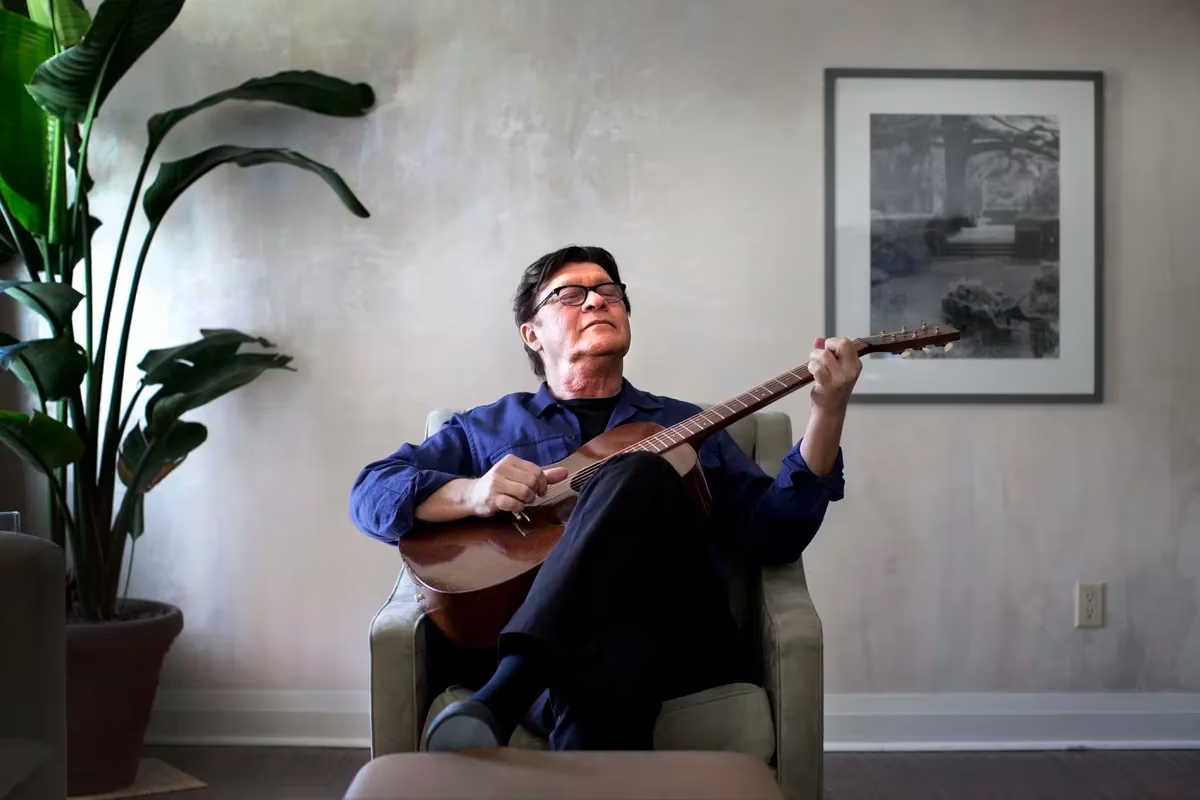
Music legend Robbie Robertson plays at the Windsor Arms in Toronto on March 28, 2011. MOE DOIRON/THE GLOBE AND MAIL
Two things about Robbie Robertson: One, he was not self-effacing about his musical legacy; two, he had nothing at all to be modest about.
He played electric guitar – a Telecaster or a Stratocaster, usually – as if it were a thug’s jackknife, and wrote lyrics with a novelist’s sense of narrative and detail. He called the band he led the Band. They were pioneer figures of a genre, Americana. They are the greatest rock band Canada has ever produced, and they never would have happened without the songwriting and conceptual vision of Mr. Robertson, who died Wednesday at the age of 80.
The Band released its first album, Music From Big Pink, in 1968. It was a time when the world’s most illustrious rock musicians were more often than not British. It was literally called the British invasion, led by the Beatles. People called Eric Clapton “God.”
But a lot of those British musicians – including George Harrison and Mr. Clapton – wanted to be in the Band, with drummer Levon Helm and Canadians Rick Danko, Garth Hudson, Richard Manuel and Mr. Robertson, a Toronto-born former teenaged guitar phenom who spent summers with his mother’s family on the Six Nations of the Grand River reserve southwest of the city.
When Mr. Clapton showed up in upstate New York to jam with the Band, he was told flat out, “We don’t jam.” No, they wrote songs, and Mr. Robertson was the group’s chief craftsman.
The Band was originally known as the Hawks. During that period, in 1965, Bob Dylan picked Mr. Robertson and company to back him when he “went electric.” The Blowin’ in the Wind singer did not hire chumps.
Pete Townshend first heard Music From Big Pink on a powerful sound system in a house owned by Peter Tork of the Monkees in Los Angeles. “I realized I was listening to something ground-breaking,” the Who guitarist later recalled.
I spoke to Mr. Robertson in 2016, upon the release of the 50th anniversary reissue of Music From Big Pink. How did he feel about rock ‘n’ roll royalty bowing to him and the Band? He took it in stride.
“We knew we were musicians’ musicians,” he said. “We knew we were speaking to a lot of people who played music. We had been gathering, on the road. We were together for seven years before we made Music From Big Pink. We had paid our dues. When the record came out, we were kind of surprised. People were like: ‘Where the hell did this come from?’ It came from experience, honing your skills and trying to find subtleties as well as the obvious.”
Asked about superstars such as Mr. Dylan, Mr. Harrison and Mr. Clapton being blown away by what he and the Band were doing, Mr. Robertson said it wasn’t just them who were impressed.
“Those guys were the ones vocal about it. But there were tons of other musicians. They knew we were speaking a certain language. And if you got it, if you had been around the block, you would see it was touching a certain place in the soul.”
Touching a certain place in the soul – that gets to it. They did that in a variety of ways: the brotherly vocal harmonies, the old-timey publicity photographs by Elliot Landry and the mystique of crack musicians holed up in the mountains near Woodstock, N.Y., as if they were sepia-toned train robbers on the run.
The Band’s most enduring legacy, of course, are the songs, more often than not written by Mr. Robertson. The other group members sang beautifully, but the Band’s voice was Mr. Robertson’s, who with his lyrics mourned the lost American South (The Night They Drove Old Dixie Down), empathized with displaced people (Acadian Driftwood) and told a quasi-biblical story that sounded like something from another century (The Weight).
Although a Canadian, Mr. Robertson had the heart of Huckleberry Finn and viewed the South through a romantic lens. His single Somewhere Down the Crazy River, from his eponymous debut solo album in 1987, was languid, sultry and cinematic.
In his book Soul Mining, Daniel Lanois, who produced the album and that charting single, spoke about the song’s lust, magic, mystery and embrace of the blues: “It was all there in Somewhere Down the Crazy River,” he wrote.
The song was inspired by Mr. Robertson’s time spent in the South as a young musician. The first chapter of his 2016 memoir, Testimony, was dedicated to the same place and time. He was 16 years old, travelling from Toronto by train to Arkansas to audition for a job playing with Ronnie Hawkins and the Hawks.
“Stared out that train window into the darkness, till I near went blind,” he wrote. Mr. Robertson translated that sense of wonderment into his music.
At the age of 9, he had told his mother, who was Mohawk and Cayuga, that he wanted to be a storyteller when he grew up. According to Mr. Robertson, she smiled and said, “I think you will.”
BRAD WHEELER
The Globe and Mail, August 10, 2023
